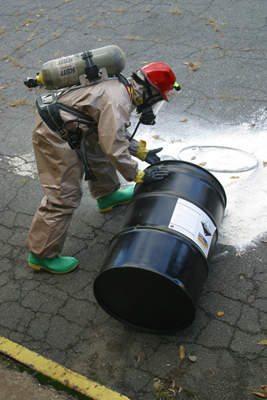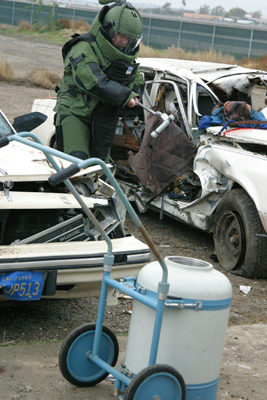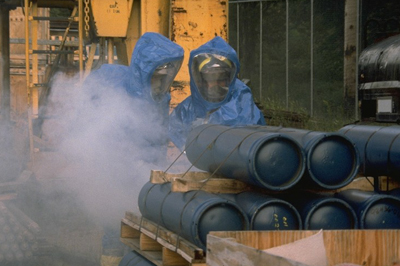Description
Each of these 11 videos includes footage of actual incidents combined with action-packed realistic training scenarios to get students up close as firefighters, police, EMTs and industry teams carry out procedures to mitigate incidents involving hazardous products.
Topics covered include:
- Hazardous properties of the product
- Occupancies where they are found
- Proper protective clothing
- Decontamination procedures
- Proper response to leak, spills or fires
- Emergency medical treatment
Valuable for Hazwoper and Right to Know training. The eleven training videos are:
Introduction to Hazardous Chemicals DVD
This hazardous chemicals safety training video provides an overview of chemical reactions, their properties and response considerations.
Introduction to Hazardous Chemicals DVD is a safety training video demonstrating experiments performed by Dan Keenan that portray chemical reactions, vividly emphasizing for the audience the hazards of chemicals and basic safe response considerations. It is Part 1 of the HazChem Series.
Topics covered include:
- DOT classifications of hazardous chemicals
- Protective clothing
- PEL, STEL, IDLH exposure guidelines
- NFPA 704 marking system
- How accidents commonly occur
- Procedures for dealing with emergencies
Leader’s Guide included.
Anhydrous Ammonia DVD
This training video teaches about Anhydrous Ammonia safety and response to Anhydrous Ammonia incidents.
Anhydrous Ammonia DVD is a safety training video about the hazards of Anhydrous Ammonia and safe response to incidents involving this dangerous gas. It is part of the HazChem Series.
Anhydrous ammonia, NH3, is widely used in agriculture and industry. Penetrating vapors from this gas are suffocating and can lead to severe health problems, even death. This exciting training video outlines an active program of safety and inspection to prevent accidents in the workplace and during emergency response.
Topics covered include:
- Hazard properties
- New DHS reporting and security requirements
- Up-to-date standards for containers
- For risk management planning: new information on toxic endpoints for anhydrous ammonia
- Illegal use of anhydrous ammonia in meth labs
- DOT and NFPA placards and labels
- Air monitoring and ventilation
- Special problems posed by enclosed spaces
- Newest information about controlling vapors after spills
- Use of water fog spray, carbon dioxide and foam to control vapors
- Protective equipment used in emergency response
Included with purchase is a Resource CD-ROM with customizable PowerPoint presentation, post-seminar quiz and other instructional aids.
Benzene, Toluene & Xylene DVD
This benzene safety training video can help you avoid the long term health problems associated with exposure to aromatic hydrocarbons.
Benzene, Toluene & Xylene DVD is part of the HazChem Series of safety training videos.
Aromatic hydrocarbons are derived in the petroleum refining process. Workers or emergency responders who are exposed may suffer long-term health problems.
Topics covered include:
- Short term and long-term health hazards of benzene, toluene and xylene
- Occupancies where they are found
- Safe handling and protective measures for workers
- Monitoring for toxic atmospheres
- Ventilation
- Symptoms of exposure
- Environmental concerns during a leak or spill
- Diking to control runoff
- Safe response procedures
- Controlling vapors and sources of ignition
- Fighting fires
Chlorine DVD
This safety training video teaches the hazards of Chlorine and safe response to Chlorine incidents.
Chlorine DVD is a safety training video about the hazards of chlorine and safe response to incidents involving chlorine. It is part of the HazChem Series of training videos.
Topics covered include:
- Vapor behavior
- Toxic effects of chlorine
- Use of Level A and Level B ensembles during response activities
- Methods of leak detection
- Container design
- Chlorine Institute A, B and C kits
- Use of water to cool containers and for vapor control
Included in the package is an Instructor’s CD-ROM with PowerPoint, post-seminar quiz and other resources helpful in presenting a training session.
Hazardous Waste DVD
This safety training video teaches the risks of hazardous waste sites and safe response protocols.
Emergency responders can’t be sure where they will find hazardous waste and what risks may be present at a suspected hazardous waste site. This safety video discusses the dangers of dealing with unknown hazardous waste.
Topics covered include:
- How to identify the substance(s)
- What factors must be considered in planning a response
- Air monitoring procedures
- Acute & chronic effects of exposure
- How to maintain a defensive approach
Includes Instructor’s CD-ROM to help structure a training seminar.
Hydrogen Sulfide DVD
This hydrogen sulfide safety training video teaches workers and responders how to protect themselves against the hazards of this toxic gas.
The Hydrogen Sulfide DVD is one of the eleven training films in the HazChem Series.
This program provides training for emergency responders and for petroleum and other industrial personnel who may encounter hydrogen sulfide and its hazards.
Topics covered include:
- Hazard properties of hydrogen sulfide
- Recommended protective clothing
- Symptoms of exposure
- Offensive versus defensive strategies in fire situations
- Safe response to chemical assisted suicide
- Monitoring equipment and methods
- Ventilation operations
Includes Instructor’s CD-ROM with PowerPoint and other resources to help structure a training seminar.
Inorganic Oxidizers DVD
Inorganic Oxidizers safety training video covers Nitric Acid, Ammonium Nitrate and Calcium Hypochlorite.
Inorganic Oxidizers DVD is a safety training video for workers and for emergency response personnel who require safety training because they work with or may respond to an incident involving inorganic oxidizers.
This program is part of the HazChem Series of safety training videos and examines the most common inorganic oxidizers: ammonium nitrate, calcium hypochlorite and nitric acid.
Topics covered include:
- Basic hazard properties of liquid and solid oxidizers
- Safety techniques for handling an emergency involving inorganic oxidizers
- Where oxidizers might be found
- What hazards are specific to each chemical
- Symptoms of exposure
- How to assist victims who have been contaminated by oxidizers
- Safe storage and handling procedures
- Incompatibility issues
- First response, size-up, protective clothing and breathing apparatus for incidents
- Isolating the scene
- Controlling vapors, containing the spill, and evacuation
- Containers, DOT placarding, NFPA markings
- Protecting water supplies
- Fire fighting, decontamination and cleaning up spills
Pesticides DVD
This pesticide safety training video is for both workers and response personnel who need to be trained in the hazard properties.
Pesticides DVD is part of the HazChem Series of safety training videos. This newly updated safety video was selected by the International Association of Fire Fighters as their standard for responding to pesticides incidents. This program teaches valuable lessons about the hazards of pesticides and how to avoid exposure when working with or responding to incidents that involve pesticides.
Topics covered include:
- Common symptoms of exposure
- Fire fighting: when it may be best not to fight a fire
- Understanding and using EPA labels
- Managing runoff
- Decontamination
- First aid for pesticide exposure
- Meister’s 2011 Crop Protection Handbook, with specifications for all the new technology products together with trade names. Over 800 pages, but user friendly so you can find the information quickly
The Instructor CD-ROM includes a PowerPoint, post-seminar quiz, copy of the script for reference and additional documents in .pdf format that will be of help in presenting a seminar.
Pesticides is the winner of the CINE Golden Eagle Award.
Propane, Butane & Propylene DVD
This safety training video teaches the hazard properties of LPG and portrays safe response.
Propane, Butane & Propylene is part of the HazChem Series of safety training videos. Propane, butane and propylene are the most common liquefied petroleum gases. Highly flammable, their containers can fail with explosive force.
This live action safety training video is for those who work with LPG and for emergency personnel who may respond to an incident where LPG is involved. It covers:
- How to determine fire protection needs for LPG facilities
- Avoiding BLEVEs
- Strategy for handling fires
- Determining water flow to cool tanks exposed to fire
Sodium Hydroxide & Potassium Hydroxide DVD
Learn about these two caustic chemicals and how to manage an effective response.
Caustics are strong alkaline chemicals, corrosive to many materials including human tissue.These caustics have also been used in the illegal manufacture of homemade bottle bombs.This safety training video includes updated information about containers and protective clothing used when using caustics or responding to incidents where they are involved. There is new information about cleaning up dry spills and on the use of acetic acid and muriatic acid in neutralization operations.Topics covered include:
- The relevance of pH
- Containers used with caustics
- Protective clothing and equipment
- Protecting water supplies from spills
- Flammability and reactivity properties of caustics
- Preventing explosions
- Neutralization operations
- Hydrogen gas formation
- Offensive vs. defensive operations for fires
- Selecting extinguishing agents for fires
- Decontamination
Instructor’s CD-ROM with PowerPoint and other resource materials.
Sulfuric Acid and Hydrochloric Acid DVD
This sulfuric acid safety video teaches how to respond safely to a corrosive incident. Covers both sulfuric acid & hydrochloric acid.
Sulfuric Acid and Hydrochloric Acid DVD is a safety training video program about the hazards of acids and safe response to incidents. It is part of the HazChem Series.
Corrosives have a destructive and irreversible effect on tissue. This program provides important safety information for workers who use, store or transport sulfuric or hydrochloric acid, as well as for emergency response personnel who might respond to an incident involving corrosives.
Topics covered include:
- How to identify corrosive acids
- Reactivity problems
- Neutralization operations
- Emergency medical operations for accidents
- Steps to take in an uncontrolled leak, spill or fire
- Diking to control runoff
- Vapor control
- Decontamination





